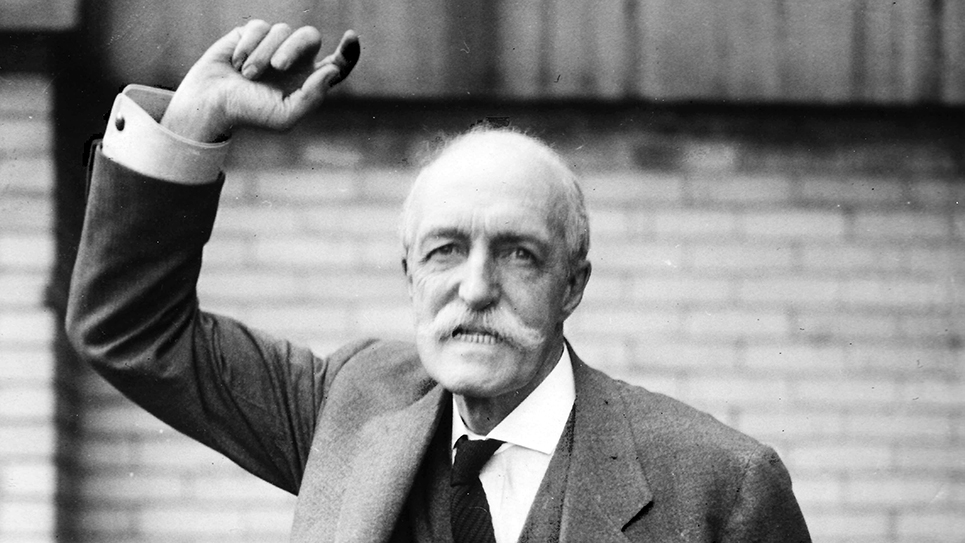By Ray Hill
Tennessee’s Second Congressional District is the most Republican in the nation from the standpoint it has never been represented by anything other than a Republican since the party has been on the ballot. There is also another statistic that is interesting about the people of the Second Congressional District; they seem to really like the men they have elected to Congress. Only one congressman has been defeated at the polls in the last 100 years. Indeed, death is to be feared more than a political opponent if history is any indication. J. Will Taylor, Howard Baker, Sr., and John Duncan all died in office.
J. Will Taylor beat an incumbent inside the GOP primary in 1918 and remained in office for the next twenty years until a heart attack carried him away. “Hillbilly Bill” Taylor had also been Tennessee’s Republican National Committeeman and was the GOP ‘boss” of the Volunteer State during the decade of the 1920s which saw the Congress dominated by Republicans and the White House occupied by three Republican presidents. “Hillbilly Bill” died in the early morning hours of November 14, 1939. Taylor was only fifty-nine years old. A special election would determine Taylor’s successor and Republicans met in convention to pick a nominee. John Jennings, Jr. announced his candidacy on November 30, 1930. Jennings said he was a candidate for the Republican nomination for Congress. John Jennings, Jr. was fifty-nine years old and a successful attorney. Jennings had been admitted to the bar in 1903 after having “read the law.”
Like J. Will Taylor, Jennings was a native of Campbell County; unlike “Hillbilly Bill”, John Jennings had moved to Knoxville. Jennings had served an eight-year term as Chancellor of the Second Judicial District and was known as “Judge” for the rest of his life. Jennings had attended the American Temperance University in Harriman and Grant University in Athens, which became Tennessee Wesleyan College. Jennings was superintendent of schools for Campbell County from 1901 – 1902 and county attorney from 1911 – 1918.
John Jennings, Jr. was unusual, at least for a congressman from Tennessee’s Second Congressional District, inasmuch as he was something of an orator. The people of the Second District usually preferred earnest and sincere men who could state their case in plain English. Most of all, the people of the Second District liked their congressmen to work hard at extending services to their constituents.
In his announcement, Jennings declared, “I will wage a vigorous campaign from the start and when elected I will be the representative of all the people of this district, regardless of party affiliation. I pledge the Republicans of this district to join hands with them in building and maintaining an active and forward-looking party in the district, state and nation.”
John Jennings, Jr. was a big supporter of the Tennessee Valley Authority, as had been J. Will Taylor. Jennings said the “TVA is bringing vast benefits to this section and all measures coming before Congress favoring its interest will have my whole-hearted support.” Jennings summarized his views, saying, “In short, advancement of the material, social and spiritual interests of the splendid people of my country will be my constant aim” should he be elected to Congress.
It was not John Jennings Jr.’s first race for Congress. Jennings had run against J. Will Taylor in 1922 and lost badly. They became friends and Jennings became one of Taylor’s most vociferous supporters. Judge Jennings’ campaign manager was J. Rector Weaver, who had been close to the late Congressman Taylor. Jennings was also part of a singing quartet which included Sheriff J. Carroll Cate, Ed Albers, president of the Albers Drug Company, and Judge Hu Webster. They gathered together to sing over WNOX on behalf of the Empty Stocking Fund.
As Second Congressional District Republicans prepared to gather in convention on December 12, Jennings had more delegates committed to support him than any other candidate for the nomination. There were three candidates opposing Jennings for the GOP nomination: Ray H. Jenkins, the colorful attorney who became legendary as “The Terror of Tellico Plains”; Jack Dance, a popular figure in Knox County GOP circles and deputy County Clerk; and lastly Ralph Tedder of Rockwood, Tennessee. The Knoxville Journal, helmed by editor Guy Smith, had suggested a plan for each candidate to release the delegates committed to him and have an open convention. Judge Jennings flatly refused. “You can’t change the rules after the game starts,” Jennings snapped. The Judge pointed out the delegates selected in Scott, Blount, Roane, Monroe, Morgan and Loudon counties had been selected in accordance with the regulations promulgated by the local parties. “Victory is in our grasp and we are not going to turn it loose,” Jennings insisted.
The convention itself was described in one local newspaper as “bedlam” with no progress having been made in selecting a nominee after two hours. Olin O. Berry, who presided as chair of the meeting, stood relatively helpless as numerous would-be chairmen swarmed like angry hornets and issued rulings from the floor. There were several near-fist-fights when the convention sought to elect a permanent chairman. Judge Jennings and his supporters backed John Kelly of Knoxville, while those delegates supporting Ray Jenkins wanted to install Judge Jesse L. Rogers as chair. The Jennings supporters demanded the roll be called by county while the Jenkins delegates loudly called for an individual roll call. John Kelly won 208 to 178 for Judge Rogers.
A handful of candidates were nominated. John Jennings’ name was placed in nomination by Frank Bowen; Jack Dance was nominated by Harry O. Bales; Jack Doughty nominated Ray Jenkins; Union County nominated its own Judge W. P. Monroe, while Anderson County delegates nominated T. L. Seeber, mayor of Clinton. Roane Countians nominated Ralph Tedder.
For an hour after the nominations were made, “pandemonium” reigned. The Jennings supporters won the first test of strength in a roll call vote, 215 – 165. As challenges flew like starlings, Chairman Olin Berry banged the podium angrily with a heavy water glass. Policemen stood on duty at the entrances to the auditorium doors, directing delegates to the main floor and spectators to the balcony, both of which were crowded.
The first ballot eliminated all the candidates save John Jennings, Jr. and Ray Jenkins. Jennings won on the second ballot, 227 to 158 for Jenkins. Jack Dance had cast his 29 votes from the Knox County delegation for Jennings. Ralph Tedder, eliminated from the balloting, saw all 28 votes from Roane County cast for Judge Jennings. A candidate needed 194 of the 387 votes to win the nomination as the Republican candidate for the House of Representatives from Tennessee’s Second Congressional District. Ray Jenkins, conceding defeat, moved that John Jennings, Jr. be made the GOP nominee by acclamation.
Jenkins was gracious in defeat, saying “to insure party harmony and the continuity of Republican Congressional control of the Second District which it has held since the Civil War” withdrew and made the motion to nominate John Jennings unanimously. Jennings praised Jenkins as a “magnificent lawyer, a magnetic individual and a true East Tennessean.” Jennings thanked his supporters and assured those who had opposed him that he held “no grudge against those splendid men and women who opposed me.”
“Later, in your counties, I’ll see you on behalf of the common cause and our common country,” Jennings promised as the delegates loudly cheered their congressional nominee.
Tennessee Democrats, noting former mayor John T. O’Connor had quite nearly upset J. Will Taylor in the Roosevelt landslide of 1936, did not readily concede the election. Quite the contrary; the Democrats likely nominated their strongest possible candidate, State Senator Hammond Fowler of Rockwood. A lawyer by trade, Fowler was nominated unanimously when Knoxville labor leader Cecil Arthur saw the handwriting on the wall and withdrew his candidacy. Only thirty-eight years old in 1939, Hammond Fowler was a powerful orator, something of a political prodigy, having won a seat in the Tennessee State Senate that had been previously occupied by a Republican.
The contest between John Jennings, Jr. and Hammond Fowler is quite likely the shortest congressional campaign in the history of the Second Congressional District, lasting all of sixteen days from the time Fowler received the Democratic nomination. “The time is short until the election Dec. 30,” John Jennings acknowledged, “and I expect to visit every community in the district. I hope I can make a speech in each of the cities. It must be a whirlwind campaign and I don’t plan to leave any stone unturned in seeking the post of my old friend, the late Rep. J. Will Taylor.”
“It will be a clean campaign, free from abuse and mudslinging, so far as I am concerned,” Jennings added.
Judge John Jennings opened his congressional campaign in LaFollette, the home of “Hillbilly Bill” Taylor. It was something of a homecoming party for Jennings. Jennings heaped praise upon the Tennessee Valley Authority and promised to be fair to both labor and capital. Jennings also touched upon a topic of growing importance to the nation with war having broken out in Europe while the Japanese Empire pillaged and looted China in the Far East. Judge Jennings pledged to support all measures for the protection and defense of America, yet he also promised he would “never vote to send an American boy to fight and die in the endless wars of Europe and Asia.” That particular promise was loudly cheered and applauded by an appreciative audience, most of whom still remembered the losses wrought by the First World War. “Why you’ll be elected unanimously in our county,” one old fellow wearing overalls cried.
Hammond Fowler opened his own campaign in Athens, Tennessee. Speaking at the courthouse, Fowler hailed TVA and lit into the record of Judge Jennings. Fowler said he not only favored developing the Tennessee River as a transportation route but also wanted bridges built over Watts Bar and the Coulter Shoals Dam.
“Jennings is the man who verbally abused President Roosevelt and now he wants to go to the sacred halls of congress to serve the nation that is being led by Roosevelt,” Fowler chided.
While Hammond Fowler held forth in Athens, John Jennings was spreading the gospel of Republicanism in Huntsville in Scott County.
With an audience of some 500 people, Jennings pledged yet again his support of TVA and the GOP nominee promised to continue to work for flood control. Jennings also spoke later that night in the city of Harriman where he again brought up flood control, saying it was the responsibility of the Federal government to protect the people from the horrors of flooding. Jennings crowed, “I have been thoroughly vindicated on my power position.”
Jennings said he had been “one of the first persons to advocate construction of Cove Creek Dam, now Norris Dam.” Jennings reminded his listeners he had been one of several prominent citizens who had traveled to Washington, D.C. to testify before a Congressional committee on behalf of the project.
The Chattanooga Daily Times published an editorial quoting Hammond Fowler as having defined the issue of the brief special election to succeed Congressman J. Will Taylor. The issue was TVA, or as Fowler put it, “the paramount issue, one which blots out Party lines and transcends other domestic and even foreign questions, is the TVA and its progress.”
Campaigning in Hammond Fowler’s home city of Rockwood, John Jennings was “greeted by scores of old friends” as the Republican nominee made a series of personal calls. Ralph Tedder, Roane County’s favorite son candidate at the GOP convention to select the nominee for the Second District introduced Judge Jennings to “civic and industrial leaders” and spent most of the day escorting the nominee while campaigning.
Bob Thompson, a veteran of the First World War and commander of the local American Legion, also accompanied the candidate about Roane County for much of Jennings’ tour of the area.
In a matter of days, the voters of the Second Congressional District would select a new congressman.





